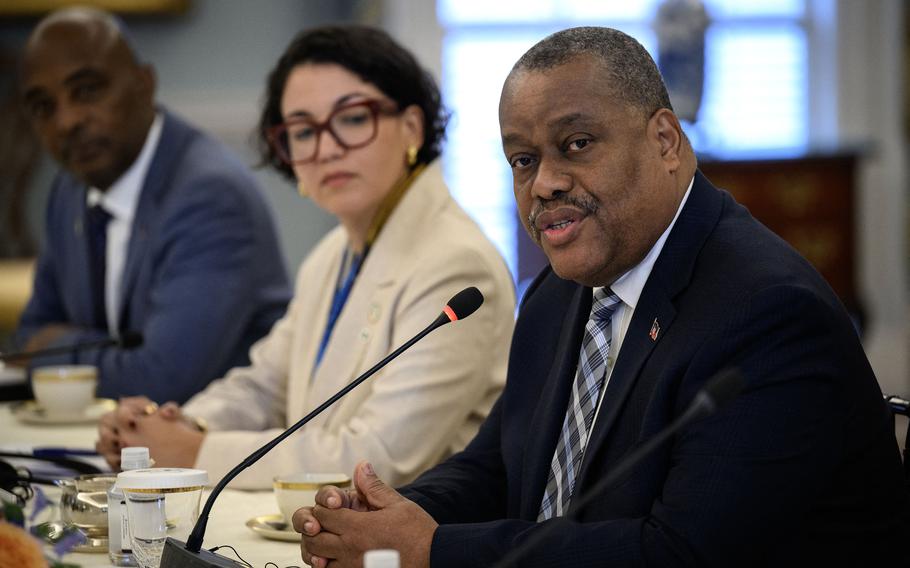
Haitian Prime Minister Garry Conille, right, speaks as Haitian Foreign Minister Dominique Dupuy, center, looks on during a meeting with U.S. Secretary of State Antony Blinken in Washington, D.C., on July 2, 2024. (Drew Angerer/AFP/Getty Images/TNS)
(Tribune News Service) — Haiti is cleaning house in its diplomatic consulate in Suriname, the Dutch-speaking country on the northeast coast of South America that has become a way station for Haitians seeking to escape their country’s gang violence.
All but one of the consulate’s Haitian diplomats have been recalled to Port-au-Prince and all 12 of the country’s locally hired contractors were fired after French authorities raised concerns that diplomatic staff could possibly be complicit in Suriname being used as a way station for Haitian migrants seeking to enter French territories.
Haiti Foreign Minister Dominique Dupuy, who immediately launched an internal investigation, alerted French and U.S. officials of her decision last week, multiple sources confirmed to the Miami Herald.
Late last month French officials contacted the Haitian government about their suspicions after dozens of Haitians arrived in French Guiana via Suriname asking for asylum. An investigation revealed that there had been at least one charter flight on July 10 from Port-au-Prince into the Suriname capital of Paramaribo.
The scheme involves Haitians paying upwards of $4,000 to a travel agency to fly into the South American country and then board buses that either take them to French Guiana across a river, or to Brazil, where they make the 7,000 miles trek north to the U.S.-Mexico border through the perilous Darien Gap between Colombia and Panama.
The ongoing investigation also revealed that among those being trafficked are under-aged children who arrive in Suriname on fake Haitian child-welfare agency documents claiming they are unaccompanied minors reuniting with families in Suriname. Such a scheme, one source said, could not happen without the complicity of diplomatic staff and possibly others in both Haiti, where all flights must be approved by the Office of National Civil Aviation, and in Suriname.
The revelations about Suriname, which is increasingly becoming a popular transit country for Haitians and other migrants, comes as Paris and Washington seek to halt the illegal movement of migrants through third countries to reach their borders.
Last year, the Biden administration announced a crack down on migrants flying expensive charter planes from Haiti, Cuba and elsewhere to reach Nicaragua, where they then proceed on foot and by buses to the U.S.- Mexico border. Haitians were paying as much as $4,000 for a one-way ticket from Port-au-Prince to Managua. By the time the administration flagged the scheme, which forced Haiti to suspend the flights, more than 30,000 Haitians had made the journey on at least 268 flights.
Accusing Nicaraguan leader Daniel Ortega of “cynically profiting” from such flights, the administration earlier this year imposed sanctions on several Nicaragua-based entities and issued alerts warning charter companies and airlines that the Central American nation was “weaponizing” migration. The U.S. has not ruled out sanctioning airlines if they are involved.
The latest scheme revolves around two companies, SAYA Travel agency in Haiti, and Fly All Ways, a Suriname-based regional airline that has been operating since 2016. The first arranges for charter trips, while the second allegedly arranges the transport for people once in Suriname. A flight is currently scheduled for Friday.
In its 2024 Trafficking In Persons report for Suriname, the U.S. State Department said that “traffickers target the increasing influx of asylum-seekers and migrants, many of whom lack legal status and protection, into and through Suriname,” saying the migrants are coming from Haiti, Venezuela, Brazil, Cuba, the Dominican Republic, Guyana and the People’s Republic of Congo, among others.
“Asylum-seekers and migrant women and girls are especially at risk for sex trafficking in Suriname, including in brothels, massage parlors, hair salons, and illegal gold mining camps in Suriname’s interior,” the report said.
©2024 Miami Herald. Visit at miamiherald.com.
Distributed by Tribune Content Agency, LLC.